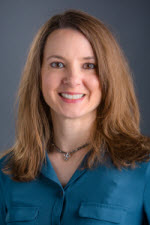
|
||
|
||
|
In 2015, an assistant medical director from the Internal Medicine department at the University of Colorado Anschutz Medical Campus contacted my supervisor with a request. She had heard about the concept of librarians rounding with inpatient teams and asked if a librarian could begin rounding with them. Because of my background in healthcare (working for 10 years as a hospital dietitian before becoming a medical librarian), I had wanted to participate in clinical rounding as a librarian since I first heard of the concept. I jumped at the chance, and met with the assistant medical director soon after. The teams typically consist of an attending physician, an upper level resident, an intern, and a medical student. During rounds, I go into each patient's room with the team, except for patients on contact isolation and in any other circumstances where it might not be appropriate. A prior understanding of medical terminology, acronyms, and abbreviations is essential to keeping up during rounds, so taking a medical terminology online course or tutorial can be helpful. Having ready access to a dictionary of medical acronyms and abbreviations is also recommended. For access to library resources, I use a laptop that converts to a tablet, connected to the hospital wireless network. I keep a Word document open for taking notes and I keep multiple tabs open on my browser for the resources that I use most – DynaMed, UpToDate, VisualDx, Micromedex, and PubMed. I typically start with a point-of-care tool, since these tend to provide quicker access to higher-level evidence and clinical practice guidelines, and go to PubMed only if I can't find what I'm looking for. The number of questions I get from the team varies from day to day. Regardless of the number of questions, however, I am constantly taking notes and keeping my ears open for situations where I might be able to contribute information. I always want to add value to the process, even if it means providing information that wasn't specifically requested. Some questions I can answer on the fly, but others require more digging, which I do back at my office after rounds are over. I send an email to the team in the afternoon, with references that answer the questions that came up that day. I presented a poster on typical rounding questions at the Midcontinental MLA Chapter meeting in 2016. I gathered all the questions I received from the team from August 2015 to June 2016, coded them with MeSH (Medical Subject Heading) terms, and analyzed the data to determine what topics came up most frequently. Over a 10-month period consisting of 43 rounding sessions, I was asked 182 questions that were coded to 231 unique MeSH terms. Broadly speaking, 53 percent of those MeSH terms fell into the Diseases category, 22 percent into the Chemicals and Drugs category, and 25 percent into other categories. Most frequently mentioned disease classifications included diseases of the digestive system, nervous system, and cardiovascular system. Most frequently mentioned drug classes were anticoagulants, platelet aggregation inhibitors, and glucocorticoids. Identifying what topics I was most likely to encounter on rounds helped me understand areas of the literature that I should pay close attention to. I signed up for several evidence alerts via email, such as Primary Care Daily Digest (Elsevier) and NEJM Journal Watch, and continue to keep an eye out for those frequently mentioned topics. After rounding in the inpatient setting for close to two years, I have recently taken a hiatus to explore other options. Currently, I am rounding weekly at an internal medicine resident outpatient clinic. I have also been approached by an attending physician about piloting a virtual reference service, where teams could submit questions via text message. One of the main keys to success is having physician champions who understand your role, appreciate your contribution, and promote your services to other physicians and residents. Identifying these champions, nurturing your relationships, and making new connections will lead to success in rounding. |
||
| Copyright 2014 - Doody Enterprises, Inc. - All rights reserved |
